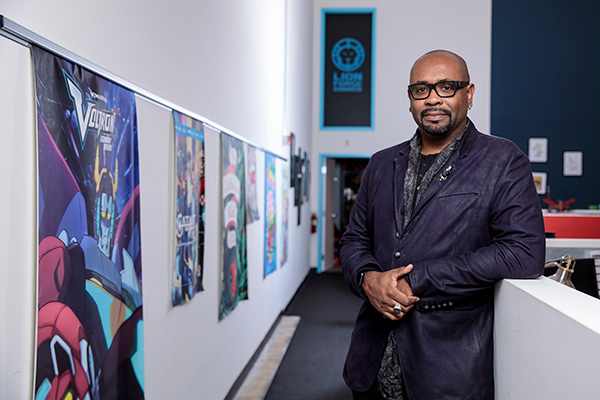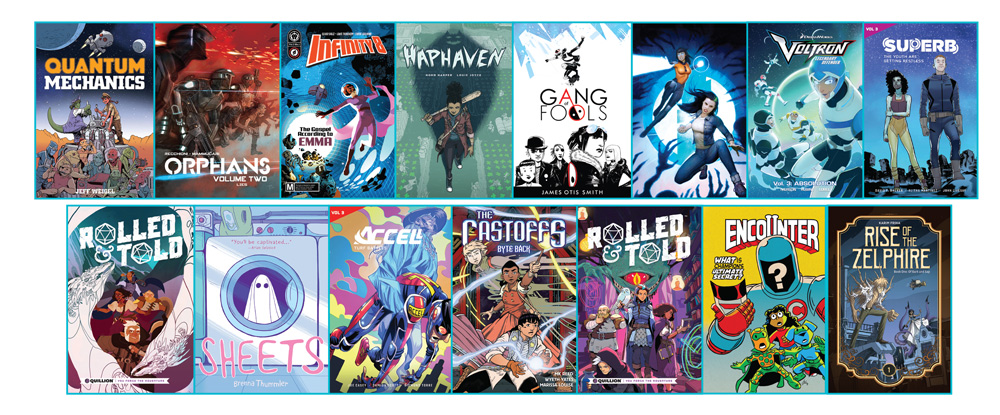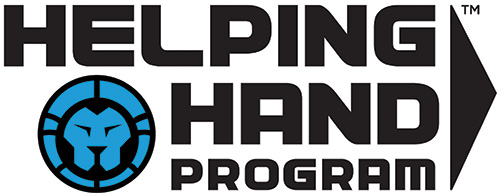Comics For Everyone: Interview with Lion Forge CEO Dave Steward II
Feb 17, 2019

Lion Forge is a trans-media studio with a focus on comics publishing across all age groups. As a company committed to “Comics for Everyone,” they strive to publish titles that reflect the diversity of the world in the characters, the creators, and the Lion Forge team, and to create content that is just as original.
Leading this “Comics for Everyone” publishing house is co-founder and CEO David Steward II. Since its creation in St. Louis, Missouri in 2011, Lion Forge has created a wide range of original and licensed titles, as well as a wealth of graphic novels and original stories for readers of all ages. David took a break from his busy schedule to talk to us at length about Lion Forge—where they came from, what they’ve accomplished, and where they’re going in 2019 and beyond…
******************************************
PREVIEWSworld: In a crowded market, Lion Forge emerged as a self-proclaimed "mission-driven" publishing company. Can you tell us what that means to you?
David Steward: When we formed Lion Forge back in 2011, it was around the concept of “Comics for Everyone,” which we in turn adopted as our motto. It describes everything we are as a company. Our goal is ultimately is to have anyone in the world come to our catalogue and find something that reflects both their interests and life experience. In order to do that, you naturally have to not only publish a diverse range of content, but also ensure that a promise of diversity is backed up by accurate portrayals and representation. This has lead us to working with a whole array of creators from various backgrounds, as we want to make sure that inclusivity means embracing anyone and everyone interested in comics.
PREVIEWSworld: Lion Forge is based in St. Louis, far from the comics publishing meccas of Los Angeles, New York and Portland. Does Lion Forge feel that location is an important part of the company's identity? How is Lion Forge involved in the St. Louis community?
David Steward: In a way I think our location is central to how we do things at Lion Forge. There’s a certain set of “midwestern values” I believe our organization embodies which goes into how we treat and work with people from our creators to our staff. I think it also goes to how we position ourselves in the community locally and in the broader publishing community. There are several charitable pursuits we engage in on a regular basis here in town, including working with the St. Louis ARC, which works to provide a lifetime of high-quality services, family support, and advocacy to people with intellectual and developmental disabilities. We have helped to develop their yearly “Superheroes for Kids” event, in support of their children’s programs. Beyond the St. Louis area, we worked with the Book Industry Charitable Foundation to set up a fund to help comic book shop owners and their employees financially in the wake of Hurricane Harvey, which still exists for those in need. This kind of work stems from those values.
We also have a certain vantage point being here in that we get a good feel on what the whole of America thinks. In a place like New York or Los Angeles, you can get caught up in a creative bubble of sorts which can make creating projects that are successful across the country difficult. Additionally, while we’re always keeping close watch on what our peers in publishing are doing, we have consciously forged our own path apart from that influence. Our innovation in publishing — and comics specifically — is driven by us alone, both creatively and operationally.
PREVIEWSworld: When Lion Forge first arrived in 2013, your publishing strategy was to go after the digital comics market, eventually moving into print through a partnership with IDW. What did you learn from these experiences that inform how you run the company today, tomorrow, and beyond?
David Steward: When we entered the marketplace, digital comics were growing so fast they looked as if they were going to be a major way of how we consume comic content. Our strategy at the time of forming our company was to publish content digitally first and use that as a way to see what fans were responding to. We hoped to then use that information to fine-tune what we’d ultimately publish in print. Given our industry’s lack of data and analytics, I still believe it could have been a good strategy, but the market shifted, and we had to change to conform to it. This shift in focus has provided us a chance to challenge ourselves to build an infrastructure that allows us to ignore some of the aspects of direct market publishing cycle that have become antiquated with advances in technology, the ever-evolving needs of the market, and the speed in which the way we communicate shifts and evolves.
PREVIEWSworld: When Lion Forge first moved into print comics through various nostalgic licenses, one of the first direct market successes for Lion Forge was the Voltron: Legendary Defender comic book series. Were you personally a fan of the series and/or toys growing up? Can you tell us about the St Louis connection, and how this came to be at Lion Forge?
David Steward: Absolutely! This was my favorite cartoon as a kid growing up. A lot of folks don’t know this bit of history, but while Voltron originally appeared in Japan (as Beast King GoLion and Armored Fleet Dairugger XV), the American version was conceived and developed by World Events, a St. Louis company which still owns Voltron today. We had been wanting to work on it since we started the company, but after missing a critical window to obtain the license we had to wait until this current version came along through Dreamworks. For me, being able to work on this was one of my “dreams come true” as a publisher, and a bit of personal civic pride to bring it back to creatively to St. Louis.
One additional fact that people may not know is that while we were waiting on Voltron to become available, we worked on a lesser known World Events property call Saber Rider and the Star Sheriffs, which we published in 2016, written by Mairghread Scott.
PREVIEWSworld: The idea of characters of color is certainly not a new one, going back to the Silver Age in some cases. Milestone Comics was the first publisher to notably make an impact on the market, with some of these characters having seen a recent return through DC. What was it that you set out to achieve in developing your own superhero universe?
David Steward: Inclusivity is in our DNA, and central to our mantra of “Comics for Everyone.” So naturally when we created a superhero universe, it would reflect that idea in its makeup. We gave this world and its characters an origin that would present the opportunity for anyone to have received powers, just as it would occur in the real world, regardless of ability, ethnic background, sexual preference, or gender identity. Our universe is more grounded and doesn’t follow the traditional tropes that our competitors do.
For instance, in our world when a character dies, that character is dead. They’re not coming back once they’re gone, regardless of their prominence in the previous storylines or line overall. Another unique thing you’ll see over time is that this universe is intended to grow and evolve with our readers. If you’re a fan of Superb, you’ll see Jonah and Kayla age from teenagers to adults and, as a result, always be tackling new problems as the world around them not only changes, but as they change as people. This is actually something we feel hasn’t been done in superhero comics before in a meaningful way, as many of the most well-known characters were first introduced as adults, with multiple origins or backstories presented after the fact.
PREVIEWSworld: The publishing mantra of Lion Forge seems to be pretty weighted toward graphic novels as time goes on. What drives that decision making, and what about that format appeals to you? With that said, what does Lion Forge hope to achieve with its monthly serialized offerings?
David Steward: When it comes to format, it’s about how the form and function of the format meets the content one is trying to produce. Our decision making really comes down to a couple of questions: “Does the story lend itself to serialization?” or “Does it need to be read in one standalone graphic novel?” Graphic novels offer us a lot of interesting ways to showcase content, whether it be size, covers, etc. What has been referred as “trade waiters” in our industry have proved a test case for the entire entertainment industry at large. “Binge-watching” series has become the norm, with streaming platforms catering to that idea with their release of original content. While graphic novels present greater upfront risk for retailers, they also present more upside in profit as well, and allow for the longer shelf-life of a product.
All of that aside, we do understand that serialized comics are a necessary part of the business. These are specialty products for a specialty market, which has the competitive edge of being the only place this format can be found. We are committed to publishing content that works in this format for the audience that prefers to read this way. Serialized comics are unique in that they provide both fans and retailers a lower barrier to entry; a great way for readers to try something new, and retailers to find the right customers for a series, character, or even publisher that has no existing sales record.

PREVIEWSworld: Let's talk about the comics publishing landscape at large. There are arguably more comic book publishers in the market than we have seen in decades, with less stores than there were 20 years ago. What can Lion Forge do to help retailers to make the best decisions for their stores and their customers?
David Steward: For one, we must keep making the best books we can. If we are out here selling books that are an easy pass, then there is no real way to help comic shops make good decisions with them. We have created lots of books in our short time as a full-service publisher that have not only won multiple awards, but also have made it onto multiple “best of” lists in the year they were published. The funny thing is that a lot of those books still haven’t found the potential of their audience yet.
We plan to continue creating books of such high-quality, as well as extending our reach to a more local level by providing comic shops more of the information they need in the proper window to help them identify the right customers in their store… as no one knows their customers better than they do. We want to give retailers what they need to know to sell our books knowledgably. As a person who has worked in retail myself, I understand how much better you can sell products you understand yourself. For that reason, we have taken all our direct market-focused marketing efforts and funneled them into what we are calling our “Helping Hand” program.
The Helping Hand program is a direct market-focused retail program that streamlines communication between us as publisher and comic shops, with advance reader copies made available to shop owners and managers so they can read our books in the initial order window. We are also creating in-store marketing material to help start the chatter in stores and create opportunities for Lion Forge employees and creators to come to their shops and throw events focused around growing the comics community in their area. Look for the Helping Hand logo in the Lion Forge section of the Previews catalog. We want to work to reduce the risk for the retailers as much as possible with publishing strategies like returnability or additional discounts on select titles across the year, in hopes that this will help them to increase the profits they make on our books. We have lots of great books coming out in 2019 and we want to take that extra step to ensure that we don’t just make comics for everyone, but also comics that can be found everywhere.
PREVIEWSworld: Lion Forge has been a market leader in age segmentation, with dedicated imprints across your publishing line. Why do you think it is important to do this?
David Steward: Since we are an inclusive publisher, we want to make sure that at all points, fans can find the books that they’d be most interested in seeing. Instead of looking at our entire catalogue, they’re able to segment things by imprint to help to narrow down their selection process. This is a great way as well for parents, librarians, and educators find things for kids, whether they be middle-grade, young adults, or early readers.
Additionally, with our own characters in the Catalyst Prime lineup, we are able to build characters and stories from the ground up to target a young adult readership. We have had a great response to both our Superb and Quincredible titles, both of which were created and written to appeal to readers who will age in tandem alongside these characters who were introduced as teenagers. These characters can find that audience in an organic way, as opposed to retrofitting existing heroes to chase a market that is clearly hungry for content.
I feel this is one way that we’ve been a leader in the market, and now we’re seeing other comic book publishers like DC follow suit with their recent imprints.
PREVIEWSworld: Many comic book publishers are making a play in Hollywood to develop either company IP, or original series in partnership with their creators. Is Lion Forge actively looking to develop anything for film or television?
David Steward: We’re always looking for ways to get word out about some the great content we’re producing. One way is being able to turn some of the comics we make into television programs and theatrical films. It has the broadest reach to the public and it also drives more people to the source materials, the comics themselves. We do have quite a few things in the works at the moment, and 2019 will definitely be a year of great announcements and surprises. Stay tuned!
PREVIEWSworld: Any closing thoughts?
David Steward: We know the direct market is a challenging business. There are arguably more publishers than there are dollars to spend at both the retailer and consumer level. We also know that in the last 15 to 20 years, comic shops have been left behind in some of the biggest successes in graphic literature, published by imprints from the bigger houses, or by companies whose focus lies in the book market, with the direct market as a secondary concern. We are a company made up of fans and comic book industry veterans, who are committed to breaking new talent from around the world for parents and children alike; both those who shop in your stores today, and those who we will work to bring in your doors tomorrow. You have already helped us get us to where we are today, and we are committed to taking you with us where we are going.
Click here to see all the new titles Lion Forge has to preorder in the February PREVIEWS!




